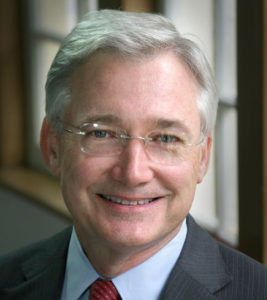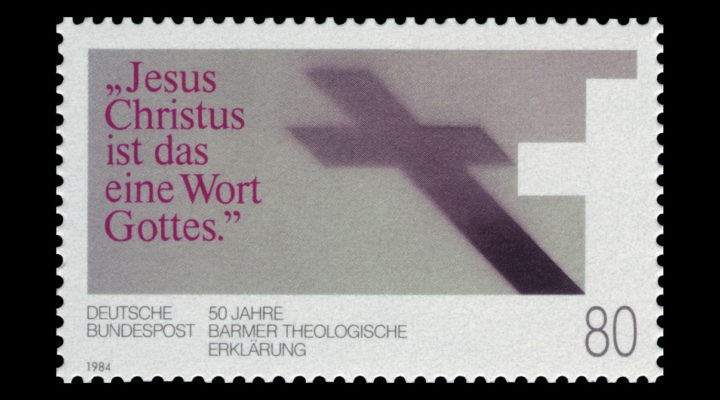It is not the first time this question has been raised, but I ponder it here: Does the church in America need a new Barmen Declaration?
In late May 1934, the Pastors’ Emergency League met in Barmen, Germany. Dietrich Bonhoeffer had helped organize it to help pastors withstand the Nazification of the German church. The German Protestant Church was falling under the thrall of Nazism and Hitler with its dark energies of racism and nationalism.

Stephen Shoemaker
With Karl Barth as the principal writer, they issued The Theological Declaration of Barmen. It said in short: Hitler is not Lord. Jesus Christ is Lord. With the Declaration, the Pastors’ Emergency League formed The Confessing Church, the small Christian community of Christian churches and pastors seeking to be true to Christ and so necessarily in resistance to Hitler.
Those gathered thought the Reich Church of Germany was breaking up and destroying the German Protestant (Evangelical) Church. The hope of the Declaration was a reunification of the church under a set of theological principles. (It would not accomplish its goal, so strong was the German Christians’ allegiance to Hitler.)
There are two statements in the Barmen Declaration that stand out to me. The first: “Jesus Christ, as he is attested for us in Holy Scripture, is the one Word of God which we have to hear and obey in life and in death.”
The second: “We reject the false doctrine, as though the church were permitted to abandon the form of its message and order to its own pleasure or to changes in prevailing ideological and political convictions.”
It could be said that in every age, since its first capitulation to Constantine, Christianity has struggled with the temptation of serving the powers-that-be rather than Christ. For German Christians the idolatries of race, nation and power took over the church. The führer had become Lord.
“In every age, since its first capitulation to Constantine, Christianity has struggled with the temptation of serving the powers-that-be rather than Christ.”
Bonhoeffer, who supported the Declaration, thought nonetheless that Barth, who was under house arrest in Bonn at the time, had not gone far enough. The theological statement, he said, needed to address more specifically issues like the Aryan Paragraph, which barred Jews from public positions and laid the groundwork for the extermination of the Jews. Theological statements need concrete application! But it was the first step toward theological and political resistance to Hitler and the Third Reich.
The American church is today confronted with the same issues, the heresies of racism and nationalism, of Christian nationalism and Christian white supremacy. There is a growing number of new churches today identifying themselves as “patriot churches.” Many churches have become that without naming themselves that.
Do we need a New Barmen Declaration to state what is at stake theologically, spiritually and politically? Do we need to go beyond the theological statement and name the present dangers to the church and nation?
We must start with the church, with an examination of our racism, of our temptation to nationalism and of our own obsession with worldly power, including the major efforts of the Religious Right, evangelical and Catholic, to create a Christian theocracy in America. We must shun allegiance to any ideology of right or left that competes with our allegiance to Christ.
“The gospel has political ramifications, but we must not become a political religion.”
The Welsh poet Waldo Williams describes Jesus as the one who refuses “conscription in any army.” The gospel has political ramifications, but we must not become a political religion, a local arm of the Republican or Democratic Party, a people who make the political realm the ultimate realm of life. We may think, as I do, that one of these parties today more closely represents biblical values, but Christ relativizes all our earthy allegiances that they not become Lord.
Bonhoeffer formed a seminary for the training of Confessing Church pastors. It lasted several years before the government shut it down. The pastors lived together. Shared spiritual practices were as important as the lectures. Maybe we begin here, in our communities of faith, letting ourselves be shaped by Word, prayer and spiritual practices that help us live more authentically Christian in these dangerous times.
Stephen Shoemaker is pastor of Grace Baptist Church in Statesville, N.C. He served previously as pastor of Myers Park Baptist in Charlotte, N.C.; Broadway Baptist in Fort Worth, Texas, and Crescent Hill Baptist in Louisville, Ky.
Related articles:
Silence in the face of evil: learning from an obscure schoolteacher who urged Karl Barth and other theologians to stand in solidarity with the Jews in Nazi Germany | Opinion by Alan Bean
Bonhoeffer moment No. 2: ‘I am now praying quite simply for freedom’ | Opinion by Bill Leonard
Politics, partisanship and the powerless | Opinion by Marv Knox


